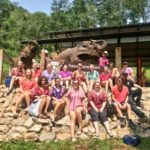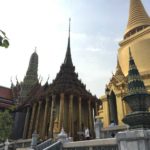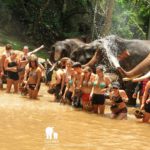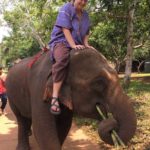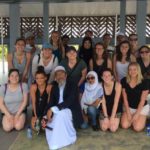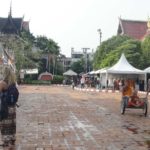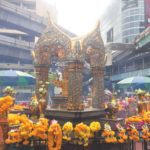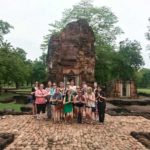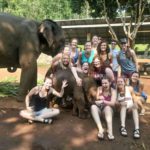Twelve students from multiple disciplines, including psychology, went to Thailand this past summer with psychology professor, Dr. Darcey Powell to study emerging adulthood as part of a May Term program at Roanoke College.
Over the course of three weeks, students were able to compare the empirical articles they had read before departure with their own experiences as they traveled across Thailand to cities including Bangkok, Phetchabun, Chiang Mai, and Koh Samui. While there, they discussed cultural similarities and differences with local emerging adults in Thailand. By traveling from city to city, students were able to see how socioeconomic settings and geography affect the lives of different emerging Thai adults.
As Peyton Holahan ’19 recalls,
The readings for our May Term were really interesting and relevant to the cultures and places we encountered. The topics in our readings varied from the collectivist[…] ideals in Thai society, to the importance of education, to the role of the transgender community in Thailand. Almost every day, we would have group discussions about our assigned readings and consider how the readings related to what we experienced or could possibly experience in our daily ventures.
Holahan ’19
When asked to talk about one of the most interesting parts of their trip, multiple students talked about their visit to Chulalongkorn University in Bangkok where they were able to interact with Thai students. Through talking one-on-one with each other and asking questions about their social and academic lives, they came to realize that perhaps they were not so different after all.
Holahan describes how her group quickly learned that social media plays a huge role in Thai student’s everyday lives, just as media does in the United States. In fact, because of the interactions with the Chulalongkorn students, Ms. Holahan came to realize that:
[…]the Thai students in Bangkok had very similar lives to our own in that most of them were working towards getting a degree and were still financially dependent on their parents. Spending the day at Chula and getting to know Thai students on a personal level completely contradicted my initial belief that our cultures were so far apart.
Sarah Hughes ’19 also mentioned her experiences talking with the psychology graduate students at Chulalongkorn University.
[…] It was funny[;] the first question they asked was about our current president and our political systems. They did not understand that our political system creates conflicts because in Thailand everyone worships the Royal Family. […] One conversation that stood out to me was when a student asked if our traffic jams in the U.S. only lasted approximately thirty minutes. I thought this was a strange question, but I shortly learned that it is easier to walk somewhere than drive because traffic jams can last for three hours.
Sarah Hughes ’19
Molly Zydel ’19 noted that for all the similarities, Thai and USA cultures are fundamentally different.
Thai culture is very different from US culture, in so many ways. First off, it is a collectivist[…] culture, meaning they emphasize the collective whole rather than the individual. This was observed in many ways, but especially in the way they treated each other. I never once saw a Thai person yelling. Thai people are also much more conservative. They don’t really like talking about themselves.
Molly Zydel ’19
This was most noticeable during the talk with graduate students from Chulalongkorn University, as Zydel continued on to say.
[…] As Americans, we were much more open to answering questions about ourselves, but when we asked them questions, the Thai students often struggled in speaking up to answer them, especially when we asked questions that were uncomfortable in the first place (e.g. we asked about sex outside of marriage and if it happened, and that question clearly made them uncomfortable).
Through their traveling, students were further exposed to various ways of thinking about life and their own culture. For Sarah Hughes ’19, the first few moments in Thailand were a startling contrast with her home in Maryland.
As soon as we landed in Bangkok I noticed many differences. For starters[,] the airport was half-inside and half-outside. We had been traveling for 23 hours in nice cold air conditioning and the second you stepped into the airport it felt like 100 degrees or more because of the humidity. Before our trip, everyone had told us to prepare for the heat but none of us expected it to be as hot and as humid as it was. I am from Maryland near Washington D.C. and I thought I knew what humidity was, but oh[,] I was wrong. The humidity in Thailand was something I have never experienced before.
Sarah Hughes ’19
Later, Ms. Hughes began to notice something else about the differences between the United States of America and Thailand.
In the United States we tend to separate poor areas from the rich areas, but in Thailand you will have a gorgeous temple that the Rama (king) built next to shacks that people live in. It stood out to me because you would have thousands of tourist[s] admiring these stunning buildings and next door are [the homeless] or people that live in a small shack without running water.
These observations fall in line with the readings, as Peyton Holahan noted…
I remember leading a group discussion on two readings about the importance of social class in society. These readings directly related to our experiences because it was clear that social class in Thai society affected the paths of Thai emerging adults as to whether they got an education or started working at a young age to support themselves. Social class was a key factor in many of the places we visited because we witnessed higher social classes in urban areas like Bangkok.
In cities like Bangkok, education was emphasized for emerging adults because they were in an urban setting with plenty of accessible resources that stressed academic goals for better jobs and opportunities. On the other hand, we also witnessed the extent of lower social classes in more rural areas like Phetchabun. In such areas, emerging adults usually resorted to working at young ages to support their families instead of pursuing higher education because it was rarely an option within their socioeconomic sphere.
In addition to these observations and experiences, students were also able to have some fun as well. Continue to part II to learn about some of the student’s and professor’s favorite parts of the trip, including getting to spend the day with elephants.
To see more pictures of the trip, click here to go to the official RC May Term Facebook Page.
Get connected!
Instagram & Twitter: #PsychRC @RC_Psychology
Facebook: https://www.facebook.com/rcpsychology
Blog: https://psych.pages.roanoke.edu/
Linked In: https://www.linkedin.com/groups/RC-Psychology-8140491/about
Website: http://www.roanoke.edu/inside/a-z_index/psychology
